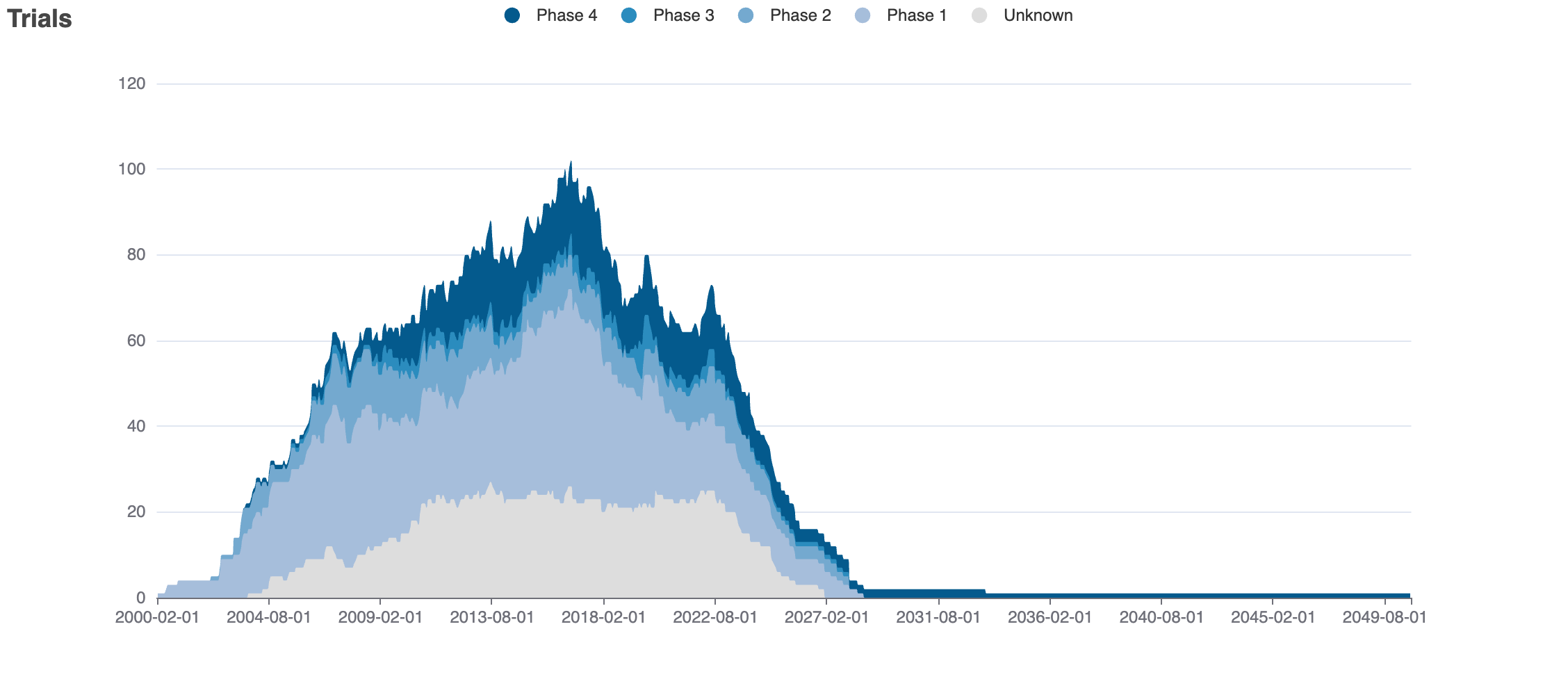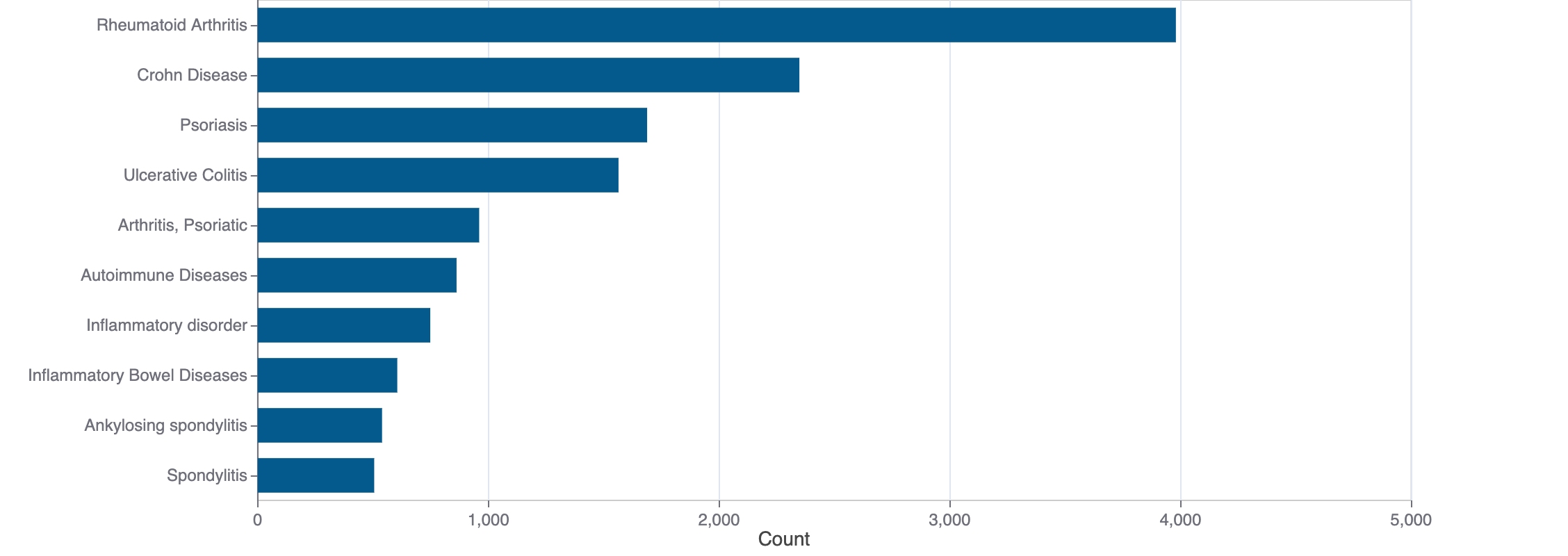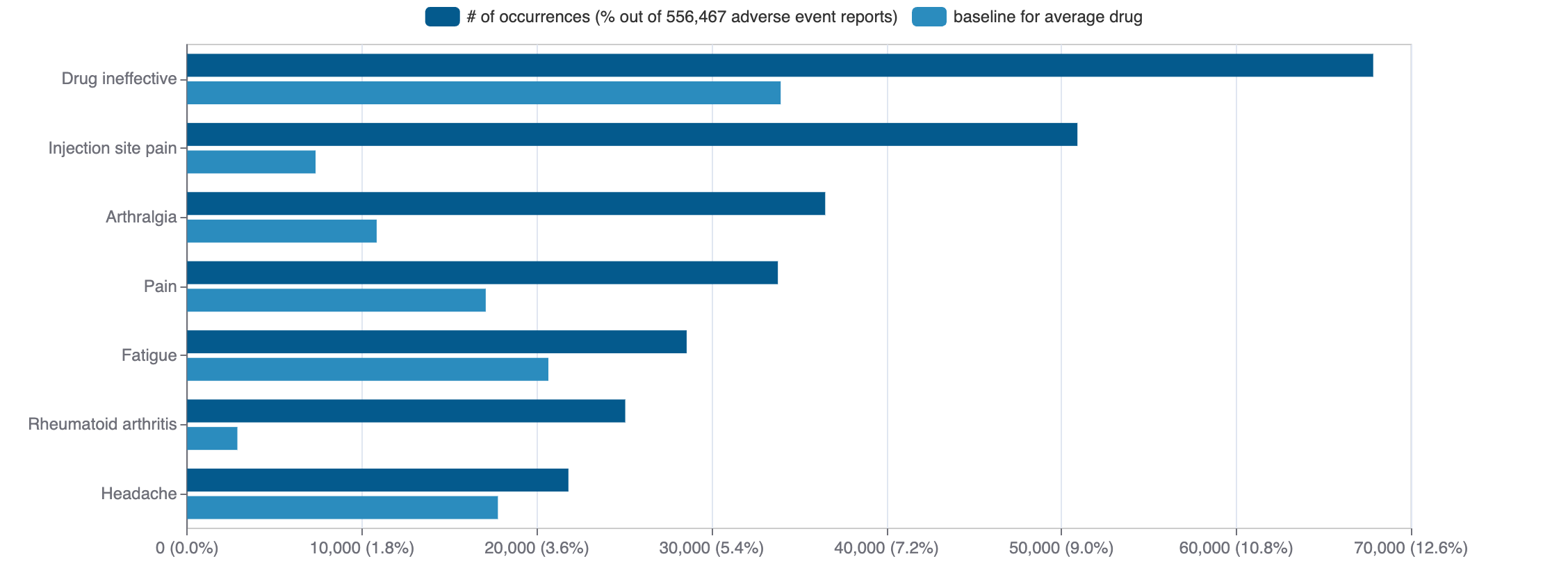Pexidartinib
Turalio (pexidartinib) is a small molecule pharmaceutical. Pexidartinib was first approved as Turalio on 2019-08-02. It is used to treat giant cell tumor of tendon sheath in the USA. The pharmaceutical is active against mast/stem cell growth factor receptor Kit and macrophage colony-stimulating factor 1 receptor. In addition, it is known to target tyrosine-protein kinase Lck, NT-3 growth factor receptor, vascular endothelial growth factor receptor 2, vascular endothelial growth factor receptor 1, receptor-type tyrosine-protein kinase FLT3, and cyclin-dependent kinase 19.
Download report
Favorite
FDA Novel Drug Approvals 2019
Commercial
Trade Name
FDA
EMA
Turalio
Drug Products
FDA
EMA
New Drug Application (NDA)
New Drug Application (NDA)
Abbreviated New Drug Application (ANDA)
Abbreviated New Drug Application (ANDA)
Pexidartinib hydrochloride
Tradename | Company | Number | Date | Products |
|---|---|---|---|---|
| TURALIO | Daiichi Pharmaceutical | N-211810 RX | 2019-08-02 | 2 products, RLD, RS |
Labels
FDA
EMA
Brand Name | Status | Last Update |
|---|---|---|
| turalio | New Drug Application | 2022-11-15 |
Indications
FDA
EMA
Indication | Ontology | MeSH | ICD-10 |
|---|---|---|---|
| giant cell tumor of tendon sheath | — | D000070779 | — |
Agency Specific
FDA
EMA
Expiration | Code | ||
|---|---|---|---|
PEXIDARTINIB HYDROCHLORIDE, TURALIO, DAIICHI SANKYO INC | |||
| 2026-08-02 | ODE*, ODE-250 | ||
| 2024-08-02 | NCE | ||
Patent Expiration
Patent | Expires | Flag | FDA Information |
|---|---|---|---|
| Pexidartinib Hydrochloride, Turalio, Daiichi Sankyo Inc | |||
| 10435404 | 2038-07-24 | DP | |
| 10941142 | 2038-07-24 | DP | |
| 10961240 | 2038-07-24 | U-2606 | |
| 9802932 | 2036-05-05 | DP | |
| 10189833 | 2036-05-05 | U-2606 | |
| 10730876 | 2036-05-05 | DP | |
| 9358235 | 2033-06-08 | U-2606 | |
| 7893075 | 2033-05-04 | DP | |
| 8461169 | 2028-04-19 | U-2606 | |
| 8404700 | 2027-11-21 | DP | |
| 8722702 | 2027-11-21 | DP | |
| 9169250 | 2027-11-21 | DP | |
HCPCS
No data
Clinical
Clinical Trials
29 clinical trials
View more details

Mock data
Subscribe for the real data
Subscribe for the real data
Indications Phases 4
Indication | MeSH | Ontology | ICD-10 | Ph 1 | Ph 2 | Ph 3 | Ph 4 | Other | Total |
|---|---|---|---|---|---|---|---|---|---|
| Giant cell tumor of tendon sheath | D000070779 | — | 1 | 2 | 1 | 1 | 5 |
Indications Phases 3
Indication | MeSH | Ontology | ICD-10 | Ph 1 | Ph 2 | Ph 3 | Ph 4 | Other | Total |
|---|---|---|---|---|---|---|---|---|---|
| Pigmented villonodular synovitis | D013586 | EFO_1001106 | M12.2 | — | — | 1 | — | — | 1 |
Indications Phases 2
Indication | MeSH | Ontology | ICD-10 | Ph 1 | Ph 2 | Ph 3 | Ph 4 | Other | Total |
|---|---|---|---|---|---|---|---|---|---|
| Melanoma | D008545 | 2 | 2 | — | — | 1 | 4 | ||
| Gastrointestinal stromal tumors | D046152 | EFO_0000505 | C49.A | 3 | 2 | — | — | — | 3 |
| Breast neoplasms | D001943 | EFO_0003869 | C50 | 1 | 2 | — | — | — | 2 |
| Sarcoma | D012509 | 2 | 1 | — | — | — | 2 | ||
| Glioblastoma | D005909 | EFO_0000515 | 1 | 2 | — | — | — | 2 | |
| Triple negative breast neoplasms | D064726 | — | 1 | — | — | — | 1 | ||
| Hemangiosarcoma | D006394 | — | 1 | — | — | — | 1 | ||
| Ovarian neoplasms | D010051 | EFO_0003893 | C56 | 1 | 1 | — | — | — | 1 |
| Non-small-cell lung carcinoma | D002289 | 1 | 1 | — | — | — | 1 | ||
| Squamous cell carcinoma of head and neck | D000077195 | 1 | 1 | — | — | — | 1 |
Show 4 more
Indications Phases 1
Indication | MeSH | Ontology | ICD-10 | Ph 1 | Ph 2 | Ph 3 | Ph 4 | Other | Total |
|---|---|---|---|---|---|---|---|---|---|
| Neoplasms | D009369 | C80 | 4 | — | — | — | — | 4 | |
| Colorectal neoplasms | D015179 | 1 | — | — | — | — | 1 | ||
| Pancreatic neoplasms | D010190 | EFO_0003860 | C25 | 1 | — | — | — | — | 1 |
| Rheumatoid arthritis | D001172 | EFO_0000685 | M06.9 | 1 | — | — | — | — | 1 |
| Adenocarcinoma | D000230 | 1 | — | — | — | — | 1 | ||
| Pharmacokinetics | D010599 | 1 | — | — | — | — | 1 | ||
| Drug interactions | D004347 | 1 | — | — | — | — | 1 | ||
| Hepatic insufficiency | D048550 | 1 | — | — | — | — | 1 | ||
| Promyelocytic leukemia acute | D015473 | C92.4 | 1 | — | — | — | — | 1 | |
| Precursor cell lymphoblastic leukemia-lymphoma | D054198 | C91.0 | 1 | — | — | — | — | 1 |
Show 1 more
Indications Without Phase
No data
Epidemiology
Epidemiological information for investigational and approved indications
View more details
Drug
General
| Drug common name | PEXIDARTINIB |
| INN | pexidartinib |
| Description | Pexidartinib is a pyrrolopyridine that is 5-chloro-1H-pyrrolo[2,3-b]pyridine which is substituted by a [6-({[6-(trifluoromethyl)pyridin-3-yl]methyl}amino)pyridin-3-yl]methyl group at position 3. It is a potent multi-targeted receptor tyrosine kinase inhibitor of CSF-1R, KIT, and FLT3 (IC50 of 20 nM, 10 nM and 160 nM, respectively). Approved by the FDA for the treatment of adult patients with symptomatic tenosynovial giant cell tumor (TGCT). It has a role as an EC 2.7.10.1 (receptor protein-tyrosine kinase) inhibitor and an antineoplastic agent. It is a pyrrolopyridine, an organochlorine compound, an aminopyridine, an organofluorine compound and a secondary amino compound. |
| Classification | Small molecule |
| Drug class | tyrosine kinase inhibitors |
| Image (chem structure or protein) | |
| Structure (InChI/SMILES or Protein Sequence) | FC(F)(F)c1ccc(CNc2ccc(Cc3c[nH]c4ncc(Cl)cc34)cn2)cn1 |
Identifiers
| PDB | — |
| CAS-ID | 1029044-16-3 |
| RxCUI | — |
| ChEMBL ID | CHEMBL3813873 |
| ChEBI ID | — |
| PubChem CID | 25151352 |
| DrugBank | DB12978 |
| UNII ID | 6783M2LV5X (ChemIDplus, GSRS) |
Target
Agency Approved
KIT
KIT
CSF1R
CSF1R
Organism
Homo sapiens
Gene name
KIT
Gene synonyms
SCFR
NCBI Gene ID
Protein name
mast/stem cell growth factor receptor Kit
Protein synonyms
c-Kit protooncogene, CD117, p145 c-kit, PBT, Piebald trait protein, Proto-oncogene c-Kit, proto-oncogene tyrosine-protein kinase Kit, Tyrosine-protein kinase Kit, v-kit Hardy-Zuckerman 4 feline sarcoma viral oncogene homolog, v-kit Hardy-Zuckerman 4 feline sarcoma viral oncogene-like protein
Uniprot ID
Mouse ortholog
Kit (16590)
mast/stem cell growth factor receptor Kit (Q8C8K9)
Alternate
LCK
LCK
NTRK3
NTRK3
KDR
KDR
FLT1
FLT1
FLT3
FLT3
CDK19
CDK19
Organism
Homo sapiens
Gene name
LCK
Gene synonyms
NCBI Gene ID
Protein name
tyrosine-protein kinase Lck
Protein synonyms
Leukocyte C-terminal Src kinase, LSK, Lymphocyte cell-specific protein-tyrosine kinase, p56(LSTRA) protein-tyrosine kinase, p56-LCK, Protein YT16, Proto-oncogene Lck, proto-oncogene tyrosine-protein kinase LCK, T cell-specific protein-tyrosine kinase, T-lymphocyte specific protein tyrosine kinase p56lck
Uniprot ID
Mouse ortholog
Lck (16818)
proto-oncogene tyrosine-protein kinase LCK (Q91X65)
Variants
Clinical Variant
No data
Financial
No data
Trends
PubMed Central
Top Terms for Disease or Syndrome:

Mock data
Subscribe for the real data
Subscribe for the real data
Additional graphs summarizing 757 documents
View more details
Safety
Black-box Warning
Black-box warning for: Turalio
Adverse Events
Top Adverse Reactions

Mock data
Subscribe for the real data
Subscribe for the real data
451 adverse events reported
View more details
Premium feature
Learn more about premium features at pharmakb.com
Learn more
